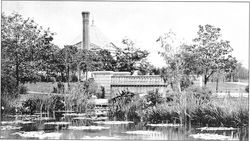 Public domain image of Douglas Park from John Graf's Chicago Parks, Arcadia Publishing, 2000.
Public domain image of Douglas Park from John Graf's Chicago Parks, Arcadia Publishing, 2000. Douglas Park is a similarly sized parcel of land on the south side that has faced more challenges with crime and drugs than Humboldt Park. However, residents were very vocal about keeping the festival out of their neighborhood. Protesters expressed concerns in community meetings to their new alderman Michael Scott Jr. (24th Ward) that the festival uses their public resources for private gain.
Representatives of Riot Fest have touted its benefits to Chicago communities. Festival director Max Wagner cited a hiring fair the event holds in early August to give hundreds of neighborhood residents job opportunities during the festival. Riot Fest has made several concessions to the concerns of North Lawndale residents, including moving a festival entrance, modifying its stage layout, and even bringing in specialized sound equipment to help manage noise levels.
According to emails released by Riot Fest Monday, September 7, St. Anthony's Hospital is threatening to sue the festival unless they are paid $154,000. An email from the hospital's law firm, McGuire Woods, reveals that the figure $98,246.27 was tentatively arrived at by calculating "expenses incurred as a result of Riot Fest occurring in Douglas Park, including but not limited to costs for additional security, staff, equipment and supplies." The added figure $54,674.00 is to cover Saint Anthony's fees for legal counsel.
Riot Fest's co-founder Mike Petryshyn asked "If these were critical concerns, why did St. Anthony's not mention them in the multiple meetings we have had since June but instead waited until less than ten days before the event to make the demand $154,000?" Riot Fest's representative Chris Mather states Riot Fest did "100 % of what St. Anthony's asked for" and has also worked tirelessly with the Chicago Park District, Chicago Police Department, Chicago Transit Authority, and several other agencies to ensure the festival ran smoothly and all the necessary permits could be issued. "It is unfortunate that St. Anthony's officials are taking a festival that should be seen as a vibrant and positive addition for the community and are trying to use it for ulterior motives," states Mather.
St. Anthony Hospital's concerns include the large volume of foot traffic and notably aggressive music the festival typically brings to Chicago neighborhoods, disrupting their patients' ability to rest. Kathryn Grosso, hospital spokeswoman, states that the hospital felt filing a temporary restraining order against the festival was "not only a necessary action at this time, but a life-saving one."
A court hearing on the lawsuit is expected on Tuesday.
 RSS Feed
RSS Feed